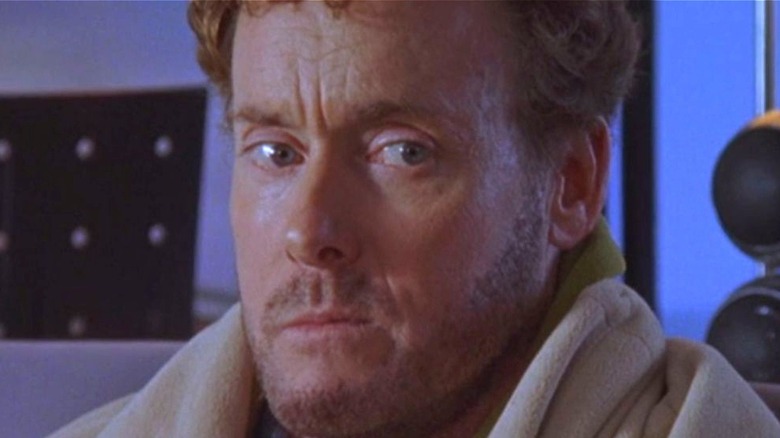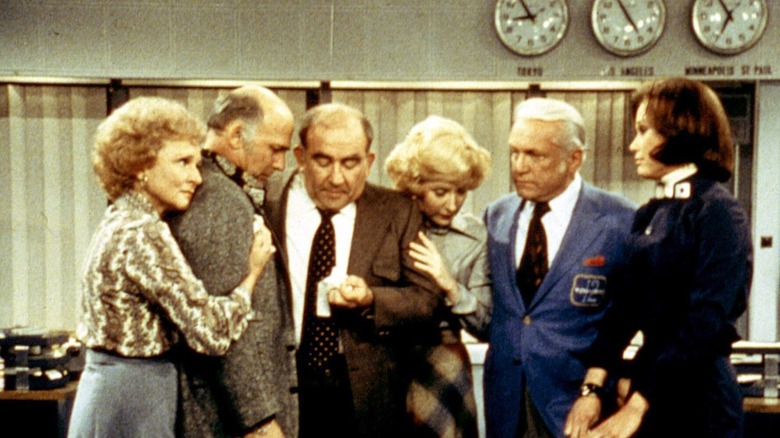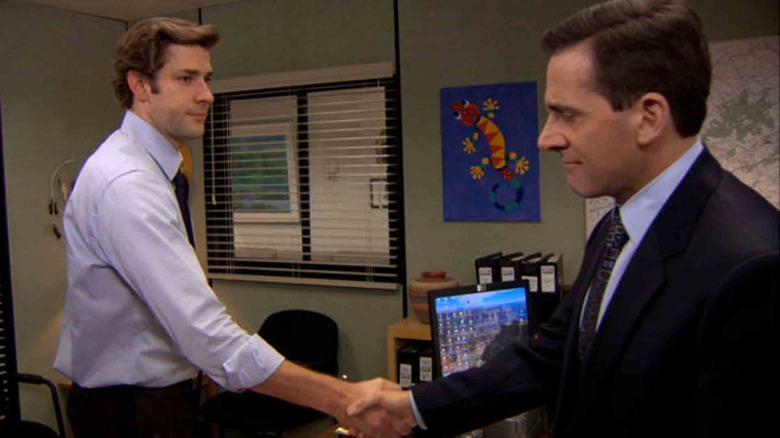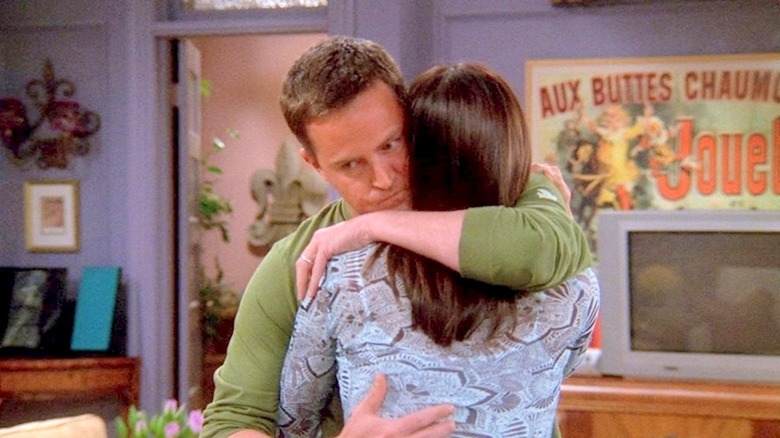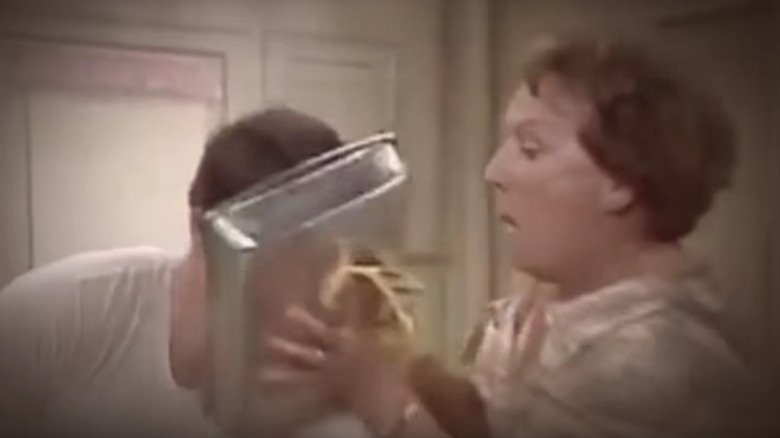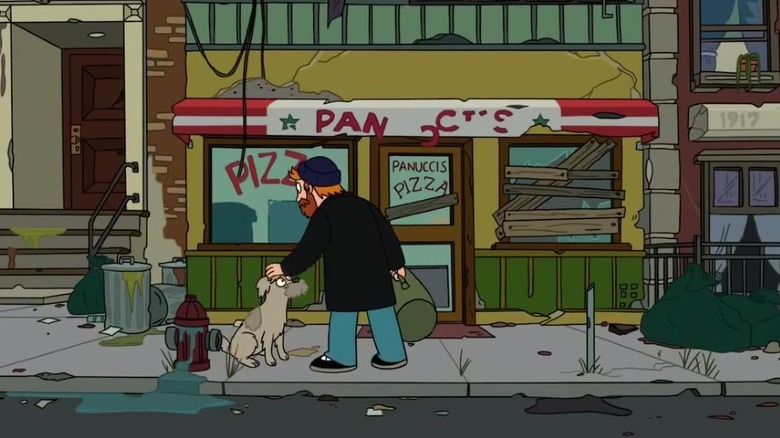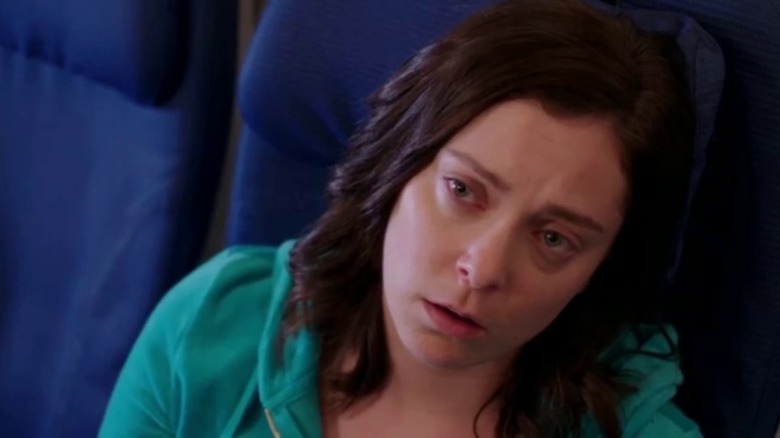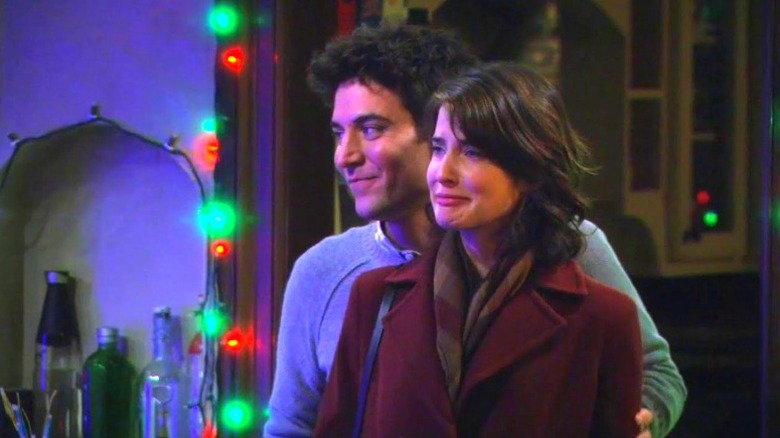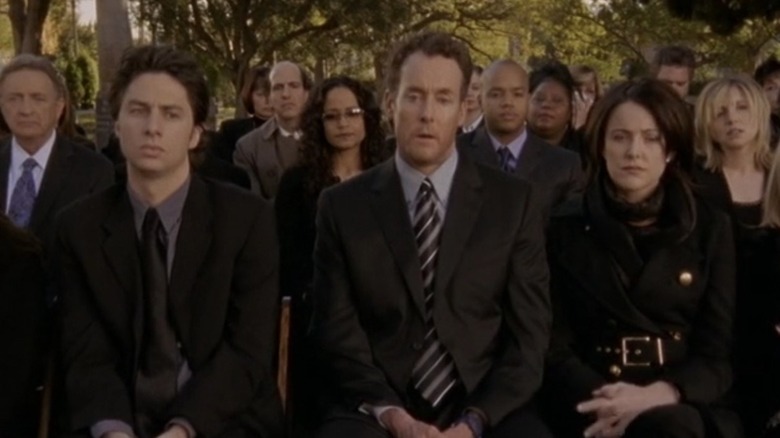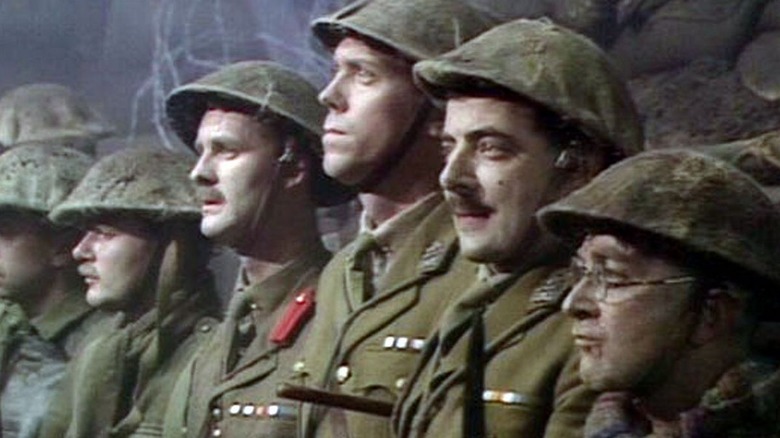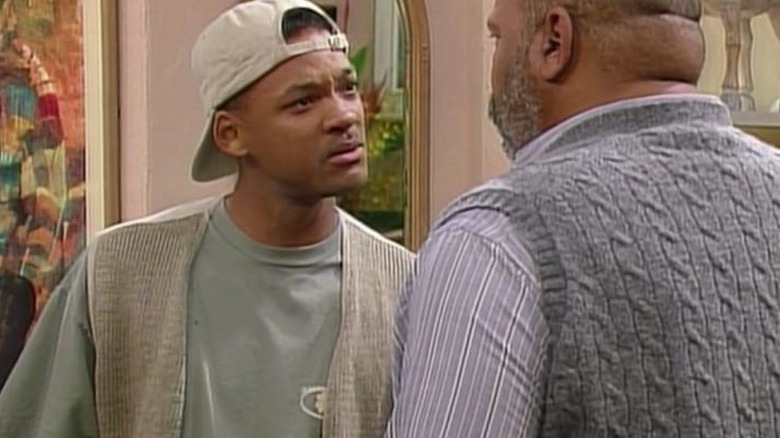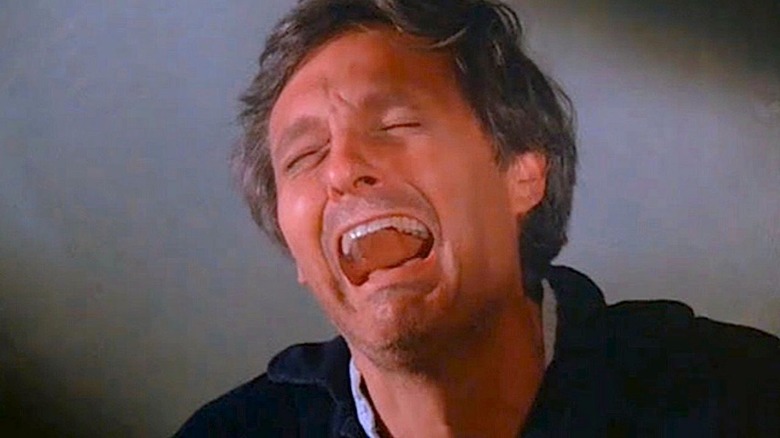Saddest Sitcom Moments Ever
More than anything else, sitcoms need to make you laugh. It's in the name of the genre, after all. But the best ones go deeper than that, using humor not just to get cheap reactions from the audience, but to dive into the human condition through well-rounded, fully developed characters. And the harsh reality is that the human condition they seek to examine has a lot more going on than running gags, witty comebacks, and goofy slapstick. There's also fear, heartbreak, and tragic loss — all of which help us appreciate the happy moments in life even more.
The best sitcoms don't shy away from sadness, tender moments, or serious themes, but embrace them head on. When they do it just right, they can move the viewer as effectively and unforgettably as any drama. So which sitcom moments pull on your heartstrings the hardest? Which ones hurt the most to revisit? From series finales to character deaths to fertility issues and PTSD, these are the saddest sitcom moments ever. WARNING: SPOILERS AHEAD.
Everyone's fired in The Mary Tyler Moore Show
In the series finale of the "Mary Tyler Moore Show," called "The Last Show," Mr. Coleman tries to salvage the Six O'Clock News' low ratings by firing members of the team. To their surprise, Lou, Mary, Murray, and Sue Ann are let go, but Ted, who's generally perceived to be the one sinking the ship, is kept on. He briefly goes to bat for everyone else, but caves to pressure, disappointing his about-to-be-former colleagues. Murray quips, "When a donkey flies, you don't blame him for not staying up that long."
Ted gives everyone a sincere send-off on his next broadcast, quoting Jack Judge's song "It's a Long Way to Tipperary" in the process. Backstage, everyone else says goodbye. They form a huddle, refusing to let go, and then shuffle together toward a box of tissues on Mary's desk. Then they all join in a rendition of "It's a Long Way to Tipperary" as they leave the building a final time.
It's a simple but effective send-off. Notably, when crafting the finale of "Friends," co-creator Marta Kauffman cited "The Last Show" as "the gold standard" and claimed it heavily influenced the ending of her own series in 2004 (via Baltimore Sun).
Michael says goodbye in The Office
Michael Scott got two massive developments in one scene in the seventh season of "The Office." The first was him getting engaged to Holly Flax. The second came moments later, when he announced to his cheering coworkers that he'd be quitting his job and moving with her to Colorado. His subordinates were almost as shocked and disappointed as we were.
His last day, featured in "Goodbye Michael," wasn't a conventional send-off episode, since none of Michael's coworkers even knew it was his last day. He told them he'd be leaving the day after his actual flight to Colorado, so he wouldn't have to endure painful goodbyes. Instead, he paid respects to each person in the office, one by one, without anyone realizing it was the last time they'd see him (at least until his surprise appearance at Angela and Dwight's wedding).
Three moments stand out. First, Michael finally gives Dwight the recommendation he'd long sought and then played his old buddy in a round of paintball. At the end of the episode, Pam catches him at the airport and hugs him goodbye after he removed his mic for the final time. Perhaps most touchingly, Jim correctly guesses this was his last day, not tomorrow, and bids him adieu in a scene that's impossible not to tear up at. It wasn't the final episode of the show, but it sure did hurt like a finale. In all the best ways.
Monica and Chandler can't conceive in Friends
As its name suggests, the Season 9 episode of "Friends" called "The One with the Fertility Test" has Monica and Chandler visiting a fertility clinic to find out why they've tried in vain for a year to conceive a baby. They initially expect good news, but are devastated to find out from the doctor that due to his abnormally low sperm count and Monica's uterus being an "inhospitable environment," it's exceedingly unlikely they'll ever have kids of their own. It's a type of pain countless couples struggle with and it's admirable the show chose to examine the issue.
It's also admirable the show stuck to its guns. There are no surprise pregnancies in Monica's future, so she and Chandler eventually adopt a child. The scene in which Chandler asks Erica (Ana Farris) if he and Monica can adopt her baby is surprisingly powerful. "I really want a kid," he says, "and when that day finally comes, I'll learn how to be a good dad. But my wife — she's already there. She's a mother without a baby."
In "The Last One, Part 1," the first half of the show's finale in Season 10, Erica unexpectedly gives birth to twins: Erica, named after her, and Jack, named after Monica's father. It's a hopeful ending to Monica and Chandler's storyline in the show, especially for anyone who identified with their struggle to conceive.
Edith gets assaulted in All in the Family
"All in the Family," which followed cantankerous Archie Bunker and his middle-class, blue-collar family in Queens, deserves more credit than it often gets. It's one of the first sitcoms to tackle topics like the Vietnam War, religion, sexuality, race, and prejudice. Some stories hold up better than others (this was the '70s, after all), but there's one hour-long episode that still rings hauntingly true for survivors of assault: "Edith's 50th Birthday."
While everyone's next door planning her surprise party, Archie's wife Edith is home alone baking a cake for herself. That's when a stranger knocks on the door, claiming to be a policeman on the hunt for a neighborhood rapist on the loose. Only after letting him inside does she realize he's the criminal himself, but by that point it's too late: The man locks her inside and holds her hostage, threatening to shoot her if she divulges the situation to anyone. Edith tries to distract him, buy time by rambling on about her birthday, and escape via bathroom breaks. She eventually escapes after smashing her burning cake into the man's face and fleeing next door, where she collapses in Archie's arms.
The police end up catching the perp, but for weeks afterwards, Edith struggles with PTSD, constant paranoia, and an inability to emotionally connect with her family. Jean Stapleton's performance in what has to be one of the most important TV episodes ever is nothing short of harrowing.
If you or anyone you know has been a victim of sexual assault, help is available. Visit the Rape, Abuse & Incest National Network website or contact RAINN's National Helpline at 1-800-656-HOPE (4673).
Fry's dog's fate in Futurama
Sad moments aren't usually the first thing that comes to mind when you think of adult sitcoms, but "Futurama" has its fair share. There's "The Luck of the Fryrish," in which Fry despises his older brother for supposedly stealing his identity after he disappeared, only to find out that all his brother's huge accomplishments were actually achieved by his nephew, who his brother named after him. In the show's finale, Fry and Leela fall in love, grow old together, and take an opportunity to start all over and relive the events of the series, even though they'll have no memory of their relationship.
But those episodes at least had heartwarming endings. "Jurassic Bark" — in which Fry discovers his old, fossilized dog, Seymour, in a museum and tries to use his DNA to clone him — does not. During the cloning process, Fry discovers that Seymour lived 12 years after Fry was frozen, concludes the dog must've moved on with his life, and aborts the process. But the final scene of the episode tells a different story: Seymour dutifully obeyed Fry's last command to wait in front of the pizza parlor where he worked until he returned from a delivery. After many years of fruitlessly waiting for Fry, through rain and snow and more than a decade, the dog laid down to sleep for a final time. Good luck watching that sequence without having to wipe your eyes.
Rebecca attempts suicide in Crazy Ex-Girlfriend
The premise of "Crazy Ex-Girlfriend" — a woman obsessed with an ex gives up a dream promotion and moves to his small town to try to win him back — seems a bit iffy for modern sensibilities.
But as fans of the show can tell you, Rebecca Bunch isn't an outdated stereotype of a woman who can't function without her man. That's because creator/star Rachel Bloom's show was filled not only with outstanding musical numbers, excellent performances, and plenty of laughs, but one of the most poignant, respectful, and powerful examinations of mental illness in TV history.
Bunch, it turns out, suffers from depression, OCD, bipolar disorder, and other conditions. Although these diagnoses do explain a lot of Rebecca's actions over the course of the series, the show wisely avoids stooping to clichés when it concerns them and never uses them to excuse her often problematic, selfish behavior.
In one scene, Rebecca is slammed with suicidal thoughts and swallows a bottle of anxiety pills. There isn't the dangerous, even accidental romanticization of suicide you might find in a show like "13 Reasons Why." Instead, her attempt is impulsive and sloppy, and not without hints of Bloom's impeccable comedic timing in the way she casts nervous glances around the plane while downing pills. In other words, it feels disarmingly real and is all the more haunting because of it.
If you or someone you know is struggling with mental health, please contact the Crisis Text Line by texting HOME to 741741, call the National Alliance on Mental Illness helpline at 1-800-950-NAMI (6264), or visit the National Institute of Mental Health website.
If you or anyone you know is having suicidal thoughts, please call the National Suicide Prevention Lifeline at 1-800-273-TALK (8255).
Robin can't have kids in How I Met Your Mother
"How I Met Your Mother" had no shortage of tear-jerking moments. Many of them almost made this list. Who can forget Lily telling Marshall his father died of a heart attack, Ted getting left at the altar in Season 4, or Robin shaking her head at Barney, indicating she'd chosen someone else?
In the end, we had to give the teary-eyed nod to "Symphony of Illumination," the episode in which Robin learns she can't have children. The framing device for this episode switches from Ted's kids to her own future ones, leading viewers to think the doctors who diagnosed her infertility might've made a mistake. However, it's later revealed they didn't. The kids don't exist and Robin, despite never wanting kids, is left feeling devastated and unsure how to talk to anyone. "It's one thing to not want something," she says to Lily, after explaining her depression by claiming to have just learned she's not allowed to pole vault. "It's another to be told you can't have it."
In the final scene, she comes home to find that Ted's filled the living room with Christmas lights. He then tells her it is indeed his job to cheer her up, even if she denies it and won't tell him what's wrong. She collapses in his arms, crying. Cobie Smulders' acting here is some of the most powerful in the series.
Dr. Cox is in denial about Ben's death in Scrubs
Several scenes in "Scrubs" could've qualified for this list. Perhaps the saddest scene of all, though, involves the story of Ben, Jordan's brother and a good friend to Dr. Cox, as well as others at Sacred Heart. Ben was an all-around likable and funny guy, so when he was diagnosed with leukemia, it was a shock to everyone at the hospital. He beats the cancer, but then unwisely heads off on a global sightseeing tour, neglecting his follow-up appointments.
In "My Screw Up," Dr. Cox learns a patient of his, presumably a Mr. Taylor, died while he was away, and chastises J.D. for this. Later, at what he thinks is a celebration of his son's first birthday, Cox tells Ben why he hates kid's parties. Then J.D. walks up and asks Cox, "Where do you think we are?" This prompts Cox to turn around and see Ben isn't there at all. We and he learn that it wasn't Mr. Taylor who died, but Ben. Cox and J.D. then head down to join the rest of the funeral guests.
From the music to J.D.'s voice-over narration about getting through trauma with the help of friends, to the vision of Ben telling Cox to forgive himself, to John C. McGinley's restrained but powerful portrayal of a man reeling from grief, this scene is enough to make anyone cry.
The men march to their deaths in Blackadder Goes Forth
Everyone knows "Mr. Bean," one of the most enduringly popular comedies ever made and a remarkable showcase for the comedic talents of one Mr. Rowan Atkinson. But fans of his work would be wise not to sleep on his other projects, such as BBC's "Blackadder" series.
This sitcom follows Atkinson as Edmund Blackadder, who is actually multiple different Edmund Blackadders, each a distant descendant of the last and a notable figure throughout English history. Hilariously, they seem to fall through the social order over time. The first Edmund is a prince in "The Black Adder." In "Blackadder II" he is a lord. In "Blackadder: The Cavalier" he's a knight. In "Blackadder: The Third" he's a royal attendant. In "Blackadder's Christmas Carol" he's a shopkeeper, and in "Blackadder Goes Forth" he's an Army captain in World War 1.
And it's here that we get a disarmingly thoughtful and haunting finale to the whole saga. The episode, titled "Goodbyeee," involves Capt. Blackadder feigning madness in an attempt to escape participation in an upcoming offensive that seems doomed to fail. However, none of the attempts work and in the final scene, Blackadder, having resigned himself to his fate, leads his friends over the trench wall to their inescapable demise. It was a surprisingly poignant and unforgettable end to a beloved comedy series and has since been described by The Guardian as one of the greatest finales of all time.
Will's dad leaves again in The Fresh Prince of Bel-Air
Most late-'80s, early-'90s sitcoms had a "very special episode" in which a serious topic like drugs or pregnancy was examined. Usually, these were embarrassingly melodramatic and made for some pretty fun mocking material later on. But "The Fresh Prince of Bel-Air" did it right, giving us one of the most memorable moments of '90s television.
In a Season 4 episode, Will gets reconnected with his long-lost father, Lou, who claims he's ready to be part of his son's life. Will is ecstatic, but Uncle Phil and Aunt Vivian are skeptical of the man and worried Will is being set up for even greater heartbreak. Turns out they're right: Lou gets cold feet about the scale of his commitment and leaves. To make matters worse, he has Phil and Vivian break the news to Will.
When Will finds out he's been abandoned again, we get to witness a disarmingly authentic rollercoaster of emotions. At first, Will lists things he's managed to do on his own, as if to say, "Who needs the guy?" But then he screams "to hell with him!" and breaks down and cries in Phil's arms. If you don't tear up at, "Why don't he want me, man?," you're probably not human.
Fans of the show were already familiar with Will Smith's comedic chops, but this brief scene showcased his incredible skills as a dramatic actor to the world. His career never looked back.
Hawkeye's 'chicken' story in M*A*S*H
Is it possible for a show to be ahead of its time if no one else has even tried to do what it did in the years since it ended? We're not sure. But we do know that M*A*S*H, about Army surgeons during the Korean War, is still one of the most popular TV shows ever made for a reason. The show's finale, one of the best TV show endings ever and among the most watched television broadcasts of all time, is focused largely on wrapping up loose ends and giving its characters appropriate send-offs.
But there's one scene in this largely feel-good closer that's anything but heartwarming. Hawkeye, sitting down with an Army psychologist, snaps when the doctor digs at a deeply buried sore spot that he doesn't want to talk about.
That sore spot, as fans of the show know, is a story about how Hawkeye once told a Korean woman on a refugee bus to silence her chicken so nearby Chinese troops wouldn't hear them. The woman did, but it wasn't a chicken. It was, much to Hawkeye's horror, her baby.
Actor Alan Alda gives a wailing, harrowing performance as his character recounts this traumatic story. It ranks as one of TV history's most powerful scenes, as well as one of the most unforgettable depictions of PTSD and the horrors of war ever filmed. And it was in a sitcom episode from 1983. Let that sink in.
If you or someone you know is struggling with mental health, please contact the Crisis Text Line by texting HOME to 741741, call the National Alliance on Mental Illness helpline at 1-800-950-NAMI (6264), or visit the National Institute of Mental Health website.
